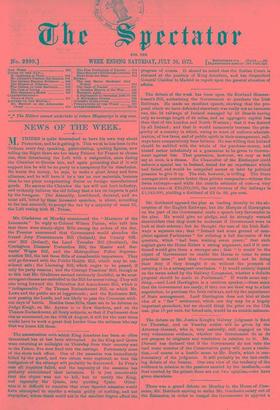The debate of the week has been upon Sir Rowland
Blenner- hasset's Bill, authorising the Government to purchase the Irish Railways. He made an excellent speech, showing that the pro- posal which we have defended elsewhere was really not an immense one, the 56 railways of Ireland managed by 56 Boards having only an average length of 48 miles, and an aggregate capital less than that of the London and North-Western ; that it was desired by all Ireland ; and that it would immensely increase the pros- .perity of a country in which, owing to want of uniform adminis- tration, of low fares, and of public spirit in their management, rail- ways have comparatively been failures. He was willing that Ireland should be saddled with the whole of the purchase-money, and hinted rather indefinitely at a guarantee to be given to Govern- ment against loss. That guarantee, however, we may as well say at once, is a dream. No Chancellor of the Exchequer could enforce a special tax in Ireland, levied for an experiment which had failed, and would be compelled sooner or later by political pressure to give it up. The risk, however, is trifling. The State manages such matters better than private companies—witness the Swiss railways—and while the outside estimate of cost—a very extreme one—is /30,000,000, the net revenue of the railways is £1,043,000, yielding a dividend of £3 6s. 8d. per cent.


































